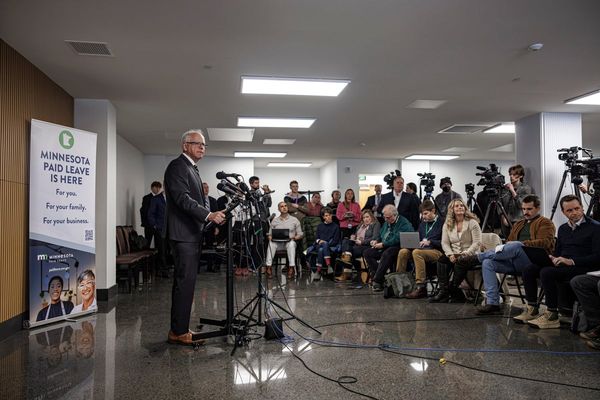
The Reserve Bank will cut the number of meetings that set official interest rates from 11 to eight times a year, starting in February, as the central bank begins implementing the recommendations of a review.
The RBA governor, Philip Lowe, announced the changes in Brisbane on Wednesday. He also addressed the bank’s decision to leave its cash rate on hold earlier this month, stating that it “remains to be determined whether monetary policy has more work to do”.
The speech may be the last Lowe makes before the treasurer, Jim Chalmers, announces who will be the RBA governor after Lowe’s seven-year term expires on 17 September. Lowe is widely expected to be replaced with the timing of the change to be determined.
The RBA board currently meets on the first Tuesday of every month with only a January break. From next year, it will gather on the first Tuesday of February, May, August and November. The other four meetings will be held midway between these meetings, with those dates to be published soon.
Less frequent and longer meetings
Each meeting will typically start on the preceding Monday afternoon and end on the Tuesday. The board’s verdict would then be announced at 2.30pm with the governor holding a media conference an hour later to explain the decision.
“The less frequent and longer meetings will provide more time for the board to examine issues in detail and to have deeper discussions on monetary policy strategy, alternative policy options and risks, as well as on communication,” Lowe said, according to a copy of his speech provided by the bank.
“Likewise, the staff will have more time for analysis, with less time spent preparing summaries of recent developments.”
The Reserve Bank’s operations had not been scrutinised closely for about three decades before the recent review. The bank’s record run of interest rate rises over the past 14 months have added to criticism, with Lowe’s position under pressure after he incorrectly forecast in late 2021 that interest rates may not need to rise until 2024.
Lowe ‘would be honoured’ to continue in role
On his own position, Lowe said: “If I was asked to continue in the role, I would be honoured to do that and I would continue.”
“If I am not asked to continue in the role, I will do my best to support my successor, and the treasurer has said he will make an announcement before the end of this month. I haven’t got anything more to add.”
Lowe is scheduled to join Chalmers on a trip to the G20 finance ministers gathering next week in India.
One key recommendation of the review was the call for the RBA to have a separate monetary policy board of experts, much like peer institutions in the United Kingdom and New Zealand. That change, though, will be part of separate legislation and was not the focus of Lowe’s speech on Tuesday.
Once the new policy board is up and running, the RBA will have to consider what alternations to make in its communications such as whether to make public how each member voted as occurs in some central banks. Similarly, whether and how members comment in public about the decisions will need to be considered, Lowe said.
On interest rates, Lowe said it was “possible that some further tightening will be required to return inflation to target within a reasonable timeframe”.
“Whether or not this is required will depend on how on how the economy and inflation evolve,” he said, adding that at its 1 August meeting the board would have an updated set of economic forecasts from the staff as well as a revised assessment of the balance of risks.
Markets were initially little changed on the comments, with the dollar easing back against the US counterpart and stocks steady.
‘Cultural change’
As to other review recommendations, Lowe said the bank was “now embarking on a significant program of cultural change”.
“Some first steps include updating the leadership goals that apply to all managers to make it clearer that they are expected to create an inclusive environment where staff can share ideas in an open and constructive way,” he said. “In addition, a comprehensive 360-degree feedback process for all senior leaders will be introduced in the year ahead and we are exploring deeper and more consistent leadership training.”
The RBA would also continue with its current approach to climate change analysis, “focusing on the implications of climate change for the economy, inflation and the financial system”, he said.
As for potential conflicts of interest of the board, Lowe said: “I want to note that the [review] panel did not hear any evidence of problems in this area and I know from first-hand experience that the board members take their responsibilities very seriously”.
Still, the board has reviewed the code of conduct and “agreed to strengthen the already strong standards by making it crystal clear that members, and entities they control, are prohibited from transacting in interest rate and foreign exchange derivatives and from active trading in financial instruments”.







